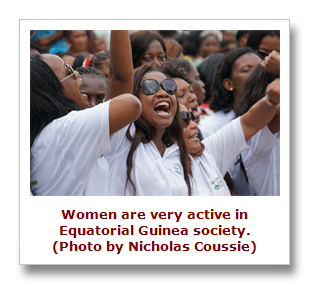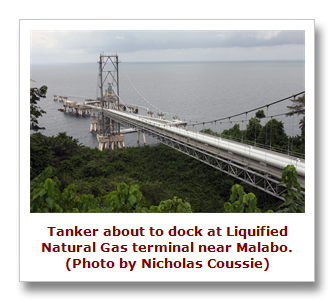Despite attempts DOJ cannot mar relations with Equatorial Guinea
An African topic, not related to the current Ebola crisis, once again appeared in the largest global media outlets; this time, devoted to a friendly settlement agreed upon by the U.S. Department of Justice and the Second Vice President of Equatorial Guinea Teodoro Obiang Mangue.
The amicable agreement was reached on three civil actions initiated against the top African official by non-governmental organizations (NGOs) that accuse him of money appropriation and corrupt practices.
So why is this newsworthy? There are a host of corruption cases, many of which are settled out of court. Teodoro Obiang Mangue is not the president, but rather the son of the incumbent president of Equatorial Guinea Obiang Nguema Mbasogo.
Nonetheless, the case is quite interesting and perhaps represents a milestone.
Firstly, this is the only time the U.S. Justice Department has settled an alleged case of personal corruption out of court. The agreement signed between Teodoro Obiang Mangue and the U.S. Department of Justice reads that defendent has not admitted his guilt in the alleged illegal appropriation of funds that were later used for buying a villa in Malibu, a Ferrari and some Michael Jackson collectibles.
Teodoro Obiang Mangue agreed to sell his villa, the Ferrari and six full-length Michael Jackson statues and transfer the proceeds to charity. The U.S. Department of Justice agreed to halt prosecution against the son of the President of Equatorial Guinea and ensured immunity for his other properties in the U.S. not covered by provisions of the agreement.
The Department also agreed to abstain from supporting third countries in their attempts to seize the property owned by the son of the President of Equatorial Guinea in the U.S.
The agreement includes another noteworthy condition: the NGOs that initiated proceedings against the Equatorial Guinea vice president will receive none of the money raised from the sale of Teodoro Obiang Mangue’s property. Apart from payments intended to reimburse huge expenses incurred by the U.S. Department of Justice in connection with the case, the rest of the funds will be forwarded to charity organizations operating in Equatorial Guinea, upon mutual agreement by Teodoro Obiang Mangue and the U.S. Department of Justice.
A proper execution of the agreement will be supervised by the federal judge who denied the condemnatory judgment against Teodoro Obiang Mangue on the basis of a lack of evidence provided by the Department of Justice, declaring that he could not arrive at a decision grounded on newspaper publications.
The U.S. Department of Justice was not allowed to use the witnesses collected by the NGOs upon the recommendations of Spanish NGOs. American investigators did not even summon the witnesses to appear before court, deeming them unreliable.
Teodoro Obiang Mangue announced that he concluded the agreement with the Department of Justice in the best interests of consolidating relations between Equatorial Guinea and the U.S.; a relationship that the American ambassador Mark L. Asquino called “great” in an interview, speaking of a positive trend in the cooperation of the two countries.
In all likelihood, the primary explanation lies in the fact that rich oil and gas deposits in Equatorial Guinea are chiefly developed by American companies.
Secondly, there is the issue of negative impact to the public image for the NGOs that initiated the lawsuit backed by the notorious billionaire and financial wildcatter George Soros.
Soros’ involvement in the action caused more than a few eyebrows to raise when considering some of the practices he has employed that have fueled several investigations and even prosecutions in a number of countries. For example, in October 2011, the European Court of Human Rights affirmed and upheld a judgment rendered by a French court that had convicted Soros for corruption. The case concerned the procurement of insider information related to security transactions of a French banking and financial company Société Générale, with the intent to use it for his personal benefit.
The son of the president of the Equatorial Guinea managed to come to agreement with the U.S. Justice Department leaving the lawsuit initiators at a distinct disadvantage, as opposed to Soros who failed to dispose of the evidence that had been assembled about him, nor come to an agreement with the French court, or at least to seek reconsideration of the judgment by the supreme judicial authorities of the European Union (The European Court of Human Rights is the supreme court, and its decisions are final and are not subject to revision.)
Finally, as each day has passed, it has become increasingly clear that the campaign aimed at the defamation of Equatorial Guinea authorities suffered a serious defeat. This small country is the third largest oil producer in sub-Saharan Africa (after Nigeria and Angola) and stands as a vivid example of an emerging Africa where many countries are in a hurry to make their mark on the world economy.
In early summer an event occurred that passed almost unnoticed by international media, namely, Equatorial Guinea was admitted as full member of the Community of Portuguese Language Countries (CPLC). Among its member states are Angola (the second-largest oil producer in Africa,) and Brazil (the largest developing country ranking 16th in proven oil reserves.) It is now evident that the combined hydrocarbon resources of the CPLC can compete favorably with Middle East oil, where production and export increasingly involve diverse political and military risks.
Still, the bright future for Equatorial Guinea does not sit well with everyone. For the past ten years, neocolonial forces have regularly attempted to topple the government of Equatorial Guinea. Those who failed to establish good relations with that country are not happy with the success of others who have succeeded. After experiencing a failure in war operations with the participation of armed mercenaries, some international financial raiders persevere in their attempts to secure an international isolation of the country, discrediting its government in every possible way.


